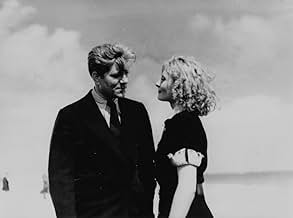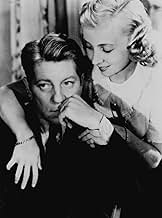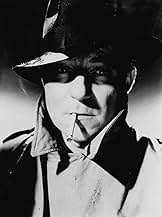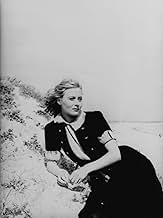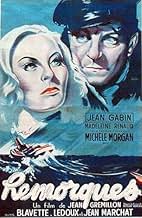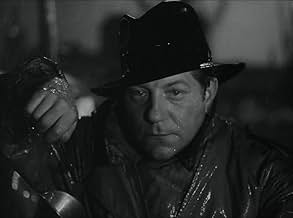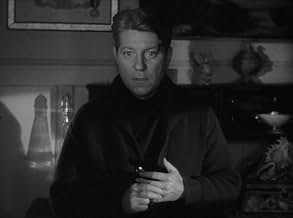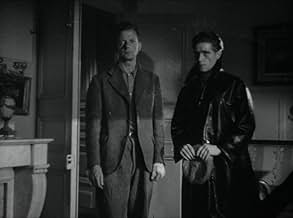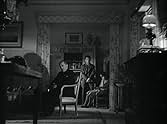VALUTAZIONE IMDb
7,2/10
1733
LA TUA VALUTAZIONE
André Laurent, il capitano di un rimorchiatore, ha sposato Yvonne dieci anni fa. Lei ha una malattia cardiaca ma non vuole dirglielo. Sogna che lui lasci il lavoro affinché possano vivere tr... Leggi tuttoAndré Laurent, il capitano di un rimorchiatore, ha sposato Yvonne dieci anni fa. Lei ha una malattia cardiaca ma non vuole dirglielo. Sogna che lui lasci il lavoro affinché possano vivere tranquillamente.André Laurent, il capitano di un rimorchiatore, ha sposato Yvonne dieci anni fa. Lei ha una malattia cardiaca ma non vuole dirglielo. Sogna che lui lasci il lavoro affinché possano vivere tranquillamente.
- Regia
- Sceneggiatura
- Star
Madeleine Renaud
- Yvonne Laurent
- (as Madeleine Renaud de la Comédie Francaise)
Charles Blavette
- Gabriel Tanguy
- (as Blavette)
Jean Dasté
- Le radio
- (as Jean Daste)
René Bergeron
- Georges
- (as Bergeron)
Henri Poupon
- Le docteur Maulette
- (as Poupon)
Marcel Pérès
- Le Meur
- (as Perez)
Marcel Duhamel
- Pierre Poubennec
- (as Duhamel)
Henri Pons
- Roger
- (as Pons)
Léonce Corne
- Un invité à la noce
- (non citato nei titoli originali)
Lucien Coëdel
- Un marin du 'Cyclope'
- (non citato nei titoli originali)
Henri Crémieux
- L'administrateur
- (non citato nei titoli originali)
Recensioni in evidenza
The making of "Remorques" began in 1939,as a follow-up to the excellent "l'étrange Monsieur Victor",and because of the Occupation,was released two years later.That also explains the length of the movie (hardly 80 minutes in the broadcast versions).
It's a simple story:the plot involves a tough sailor,Gabin,torn between two women ,the frail Madeleine Renaud,Gremillon's favorite actress (she was featured in all of his four movies of the 1938-1943 period),and the disillusioned Michèle Morgan (with whom he had teamed up in Carné's famous "quai des brumes").
The banal plot matters much less than the atmosphere;the star of the movie is the Ocean:you can hear,feel or see it ceaselessly along the viewing.This ocean which nobody can tame,which breaks willpower.For man must work and woman must weep..
SPOILERS: The ending climaxes the movie.A distraught incredulous Gabin gazes at his dead wife whilst a lugubrious siren desperately wails there down by the ocean.Then the man,forgetting his plight,walks across the harbor to come to the rescue of the boat in distress:you can hear voices chanting prayers for the dead as he makes his way through darkness .This ending has the strength of an epic Victor Hugo poem.
It's a simple story:the plot involves a tough sailor,Gabin,torn between two women ,the frail Madeleine Renaud,Gremillon's favorite actress (she was featured in all of his four movies of the 1938-1943 period),and the disillusioned Michèle Morgan (with whom he had teamed up in Carné's famous "quai des brumes").
The banal plot matters much less than the atmosphere;the star of the movie is the Ocean:you can hear,feel or see it ceaselessly along the viewing.This ocean which nobody can tame,which breaks willpower.For man must work and woman must weep..
SPOILERS: The ending climaxes the movie.A distraught incredulous Gabin gazes at his dead wife whilst a lugubrious siren desperately wails there down by the ocean.Then the man,forgetting his plight,walks across the harbor to come to the rescue of the boat in distress:you can hear voices chanting prayers for the dead as he makes his way through darkness .This ending has the strength of an epic Victor Hugo poem.
A simple story. at first sigh, too simple. because it could seems be well known. but not the love story is the axis. but the atmosphere. the performances. the ocean. the mixture of duty, romance and clash against reality. the strange beauty of the meet between Morgan and Gabin after "Quai des brues"). and, sure, the moving end. a film who remains bitter -seductive against the decades. for its remarkable simplicity. for admirable performances. and for reasons escaping to precise definition.
Andre Laurent, the captain of a tugboat, married Yvonne ten years ago. She has a heart disease but does not want to tell him. She dreams he quits his job so they can live quietly. One night, during a sea rescue, he meets Catherine. She wants to leave her husband, the captain of the rescued ship.
Jean Grémillon (1901-1959) seems to be a director who knows what he wants. He started this film as the war began (or just prior), and despite France being taken over by Germany, and having to reshoot some footage, he kept at it. And what we get is actually a really good movie. Sometimes I think Criterion releases their eclipse sets just to make a point of saying France, Japan, etc still had movies during World War II, and is not necessarily concerned about how influential or important they may be.
This one looks beautiful and surely had an impact. It reminds me of the sort of cinematography we got from the val Lewton-produced films.
Jean Grémillon (1901-1959) seems to be a director who knows what he wants. He started this film as the war began (or just prior), and despite France being taken over by Germany, and having to reshoot some footage, he kept at it. And what we get is actually a really good movie. Sometimes I think Criterion releases their eclipse sets just to make a point of saying France, Japan, etc still had movies during World War II, and is not necessarily concerned about how influential or important they may be.
This one looks beautiful and surely had an impact. It reminds me of the sort of cinematography we got from the val Lewton-produced films.
There are films whose production could be a good subject for a film script. One of these cases seems to me to be 'Remorques' (the English distribution title was 'Stormy Waters'). The director of this film was Jean Grémillon, a very interesting filmmaker, a documentarist and a musician as well, an artist involved in the anti-Nazi resistance but also the author of several films produced and distributed during the occupation. These films could be the subject of a case study on the art of cinema under conditions of occupation and war, on the boundaries between dignity and collaboration under conditions of censorship. 'Remorques' is one of them. Filming began in the summer of 1939 and was interrupted by the outbreak of war, when Jean Gabin and other members of the film crew were called up in the army. Continuing in 1940, filming was interrupted again with the fall of Paris, to be completed in 1941. The film was first distributed in occupied France, with the approval of German censorship, although its stars, Jean Gabin and Michèle Morgan had meanwhile taken refuge in America. The international premiere did not take place until after the war, in 1946. Beyond this interesting history, 'Remorques' is a film with many qualities that make it stand the test of time and remain relevant over 80 years after its production.
The screenplay written by André Cayatte and Jacques Prévert, who adapted a novel by Roger Vercel for the screen, offers us a story that takes place on the ocean and on the shores of the (Atlantic) ocean which plays an important role. André Laurent, the film's main hero, is the captain of a tugboat which rescues and tows boats in distress during storms on the ocean. In such a situation, he meets Catherine, the wife of the captain of another ship, who decides to leave her husband. The romance that develops between André and Catherine endangers André's career as a seafarer dedicated to saving others and the marriage to his faithful wife Yvonne.
The romantic story is quite banal, but the film is interesting because of the way it is conceived visually and, of course, by the presence of two of the most formidable French actors of that period. Jean Gabin and Michèle Morgan had already worked together in Marcel Carné's 'Le quai des brumes' and the producers bet correctly by casting the two actors in the main roles. It is fascinating to this day to watch the way close-ups are used to make the characters' feelings cross the screen and the magnetism between them in the scenes where they are together. Jean Grémillon was a very interesting filmmaker, with experience in documentary films. Some of the scenes are shot on real boats and they convey authenticity and drama. The original intention was for most of the filming to take place at sea, but for various reasons, some of the action scenes had to be produced in the studio with miniature models. Too bad. On the other side we can admire the use of mobile cameras in the scenes on the beach or in the city of Brest. Here Grémillon anticipates techniques that would become basic instruments in the toolkits of New Wave directors two decades later. 'Remorques' is a film that bears the mark of the period in which it was made, but which manages to boldly combine cinematic genres. Although made in difficult conditions, it is solid and interesting enough to still be worth watching today.
The screenplay written by André Cayatte and Jacques Prévert, who adapted a novel by Roger Vercel for the screen, offers us a story that takes place on the ocean and on the shores of the (Atlantic) ocean which plays an important role. André Laurent, the film's main hero, is the captain of a tugboat which rescues and tows boats in distress during storms on the ocean. In such a situation, he meets Catherine, the wife of the captain of another ship, who decides to leave her husband. The romance that develops between André and Catherine endangers André's career as a seafarer dedicated to saving others and the marriage to his faithful wife Yvonne.
The romantic story is quite banal, but the film is interesting because of the way it is conceived visually and, of course, by the presence of two of the most formidable French actors of that period. Jean Gabin and Michèle Morgan had already worked together in Marcel Carné's 'Le quai des brumes' and the producers bet correctly by casting the two actors in the main roles. It is fascinating to this day to watch the way close-ups are used to make the characters' feelings cross the screen and the magnetism between them in the scenes where they are together. Jean Grémillon was a very interesting filmmaker, with experience in documentary films. Some of the scenes are shot on real boats and they convey authenticity and drama. The original intention was for most of the filming to take place at sea, but for various reasons, some of the action scenes had to be produced in the studio with miniature models. Too bad. On the other side we can admire the use of mobile cameras in the scenes on the beach or in the city of Brest. Here Grémillon anticipates techniques that would become basic instruments in the toolkits of New Wave directors two decades later. 'Remorques' is a film that bears the mark of the period in which it was made, but which manages to boldly combine cinematic genres. Although made in difficult conditions, it is solid and interesting enough to still be worth watching today.
Seas cover seven tenths of the terrestrial globe and have inspired painters, writers, composers and not a few film-makers and this adaptation of a novel by Roger Vercel is one of the very best of its type.
Considered by the French to be among their most gifted directors, Jean Grémillon is fated to be little known abroad except to a coterie of cinéphiles. He had envisioned a far more realistic storm sequence to be filmed in Brittany but this was deemed impracticable for health and safety reasons and he was obliged to shoot in UFA's studios at Billancourt. Nonetheless this sequence still comes off pretty well. Filming came to a grinding halt with the outbreak of war and it was not completed and released until 1941 by which time its two stars had gone to Hollywoodland.
Navigating the stormy waters of desire are Jean Gabin and Michéle Morgan, one of Cinema's most memorable couples. On-screen chemistry is hard to define but their deep fondness for each other off-screen is evident whilst her ethereal quality is perfectly allied to his earthiness. As his wife is Madeleine Renaud who was later to star in Grémillon's excellent but underrated 'Le Ciel est a vous'. Renowned as a stage actress her sporadic appearances in film represent quality over quantity. Fernand Ledoux makes the most of a thankless role and if you blink you'll miss an uncredited Alain Cuny.
Stunning cinematography by one of his nation's finest, Armand Thirard, powerful score by Roland-Manuel whilst at the insistence of Grémillon and Gabin, the screenplay has been entrusted to Jacques Prévert whose poetic/realist style is perfectly suited to this tale of doomed love and the forces of Nature.
Grémillon's ambitious projects were constantly thwarted by the constraints of commercial cinema but his comparatively small output is a legacy to be treasured.
Considered by the French to be among their most gifted directors, Jean Grémillon is fated to be little known abroad except to a coterie of cinéphiles. He had envisioned a far more realistic storm sequence to be filmed in Brittany but this was deemed impracticable for health and safety reasons and he was obliged to shoot in UFA's studios at Billancourt. Nonetheless this sequence still comes off pretty well. Filming came to a grinding halt with the outbreak of war and it was not completed and released until 1941 by which time its two stars had gone to Hollywoodland.
Navigating the stormy waters of desire are Jean Gabin and Michéle Morgan, one of Cinema's most memorable couples. On-screen chemistry is hard to define but their deep fondness for each other off-screen is evident whilst her ethereal quality is perfectly allied to his earthiness. As his wife is Madeleine Renaud who was later to star in Grémillon's excellent but underrated 'Le Ciel est a vous'. Renowned as a stage actress her sporadic appearances in film represent quality over quantity. Fernand Ledoux makes the most of a thankless role and if you blink you'll miss an uncredited Alain Cuny.
Stunning cinematography by one of his nation's finest, Armand Thirard, powerful score by Roland-Manuel whilst at the insistence of Grémillon and Gabin, the screenplay has been entrusted to Jacques Prévert whose poetic/realist style is perfectly suited to this tale of doomed love and the forces of Nature.
Grémillon's ambitious projects were constantly thwarted by the constraints of commercial cinema but his comparatively small output is a legacy to be treasured.
Lo sapevi?
- QuizThe film's production was heavily disrupted by the Second World War. Filming started in July 1939 but was interrupted on 3 September due to France declaring war on Germany, with director Jean Grémillon and lead actor Jean Gabin being mobilized. With a special permission granted, shooting resumed on 6 May 1940 but was interrupted again in June with the German army at the gates of Paris, leading producer Joseph Lucachevitch to flee to the USA while assistant director Louis Daquin and editor Marcel Cravenne took the film reels to the south of France, in Marseille and Pau. Filming resumed for the final time under German occupation in 1941, despite both lead actors Jean Gabin and Michèle Morgan having fled to the USA and concluded on 2 September, with some planned scenes having never been shot.
- ConnessioniEdited into Spisok korabley (2008)
I più visti
Accedi per valutare e creare un elenco di titoli salvati per ottenere consigli personalizzati
- How long is Stormy Waters?Powered by Alexa
Dettagli
- Data di uscita
- Paese di origine
- Sito ufficiale
- Lingua
- Celebre anche come
- Stormy Waters
- Luoghi delle riprese
- Aziende produttrici
- Vedi altri crediti dell’azienda su IMDbPro
- Tempo di esecuzione
- 1h 31min(91 min)
- Colore
- Proporzioni
- 1.37 : 1
Contribuisci a questa pagina
Suggerisci una modifica o aggiungi i contenuti mancanti

